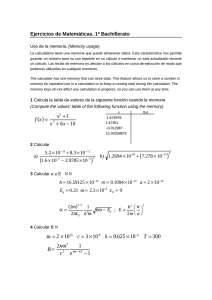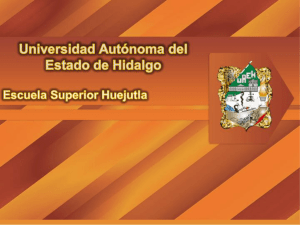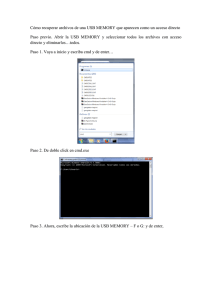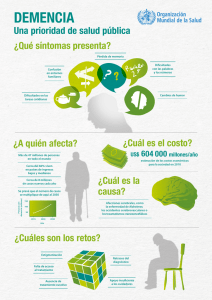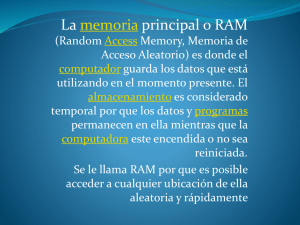cambios en la memoria 12
Anuncio
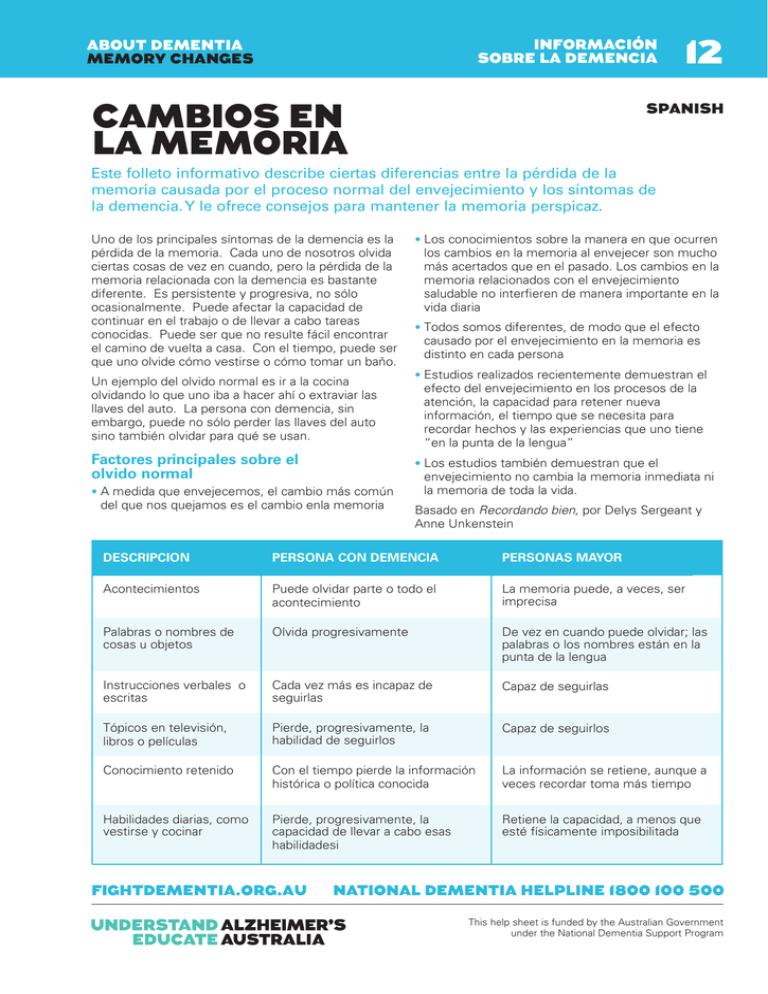
INFORMACIÓN SOBRE LA DEMENCIA ABOUT DEMENTIA MEMORY CHANGES CAMBIOS EN LA MEMORIA 12 SPANISH Este folleto informativo describe ciertas diferencias entre la pérdida de la memoria causada por el proceso normal del envejecimiento y los síntomas de la demencia. Y le ofrece consejos para mantener la memoria perspicaz. Uno de los principales síntomas de la demencia es la pérdida de la memoria. Cada uno de nosotros olvida ciertas cosas de vez en cuando, pero la pérdida de la memoria relacionada con la demencia es bastante diferente. Es persistente y progresiva, no sólo ocasionalmente. Puede afectar la capacidad de continuar en el trabajo o de llevar a cabo tareas conocidas. Puede ser que no resulte fácil encontrar el camino de vuelta a casa. Con el tiempo, puede ser que uno olvide cómo vestirse o cómo tomar un baño. Un ejemplo del olvido normal es ir a la cocina olvidando lo que uno iba a hacer ahí o extraviar las llaves del auto. La persona con demencia, sin embargo, puede no sólo perder las llaves del auto sino también olvidar para qué se usan. Factores principales sobre el olvido normal •A medida que envejecemos, el cambio más común del que nos quejamos es el cambio enla memoria •L os conocimientos sobre la manera en que ocurren los cambios en la memoria al envejecer son mucho más acertados que en el pasado. Los cambios en la memoria relacionados con el envejecimiento saludable no interfieren de manera importante en la vida diaria •T odos somos diferentes, de modo que el efecto causado por el envejecimiento en la memoria es distinto en cada persona •E studios realizados recientemente demuestran el efecto del envejecimiento en los procesos de la atención, la capacidad para retener nueva información, el tiempo que se necesita para recordar hechos y las experiencias que uno tiene “en la punta de la lengua” •L os estudios también demuestran que el envejecimiento no cambia la memoria inmediata ni la memoria de toda la vida. Basado en Recordando bien, por Delys Sergeant y Anne Unkenstein DESCRIPCION PERSONA CON DEMENCIA PERSONAS MAYOR Acontecimientos Puede olvidar parte o todo el acontecimiento La memoria puede, a veces, ser imprecisa Palabras o nombres de cosas u objetos Olvida progresivamente De vez en cuando puede olvidar; las palabras o los nombres están en la punta de la lengua Instrucciones verbales o escritas Cada vez más es incapaz de seguirlas Capaz de seguirlas Tópicos en televisión, libros o películas Pierde, progresivamente, la habilidad de seguirlos Capaz de seguirlos Conocimiento retenido Con el tiempo pierde la información histórica o política conocida La información se retiene, aunque a veces recordar toma más tiempo Habilidades diarias, como vestirse y cocinar Pierde, progresivamente, la capacidad de llevar a cabo esas habilidadesi Retiene la capacidad, a menos que esté físicamente imposibilitada This help sheet is funded by the Australian Government under the National Dementia Support Program 12 La verdad de los mitos sobre la memoria Primer mito La falta de memoria es señal de que el cerebro está fallando. Hecho Si no tuviéramos la capacidad de olvidar, nos volveríamos locos. La capacidad de recordar lo que es importante y desechar el resto es una capacidad que debe valorarse. Segundo mito Cada día se pierden 10,000 células cerebrales, y un día simplemente se acaban. Hecho Este es un temor exagerado. Es verdad que ciertas partes del cerebro pierden células cerebrales, pero no en las áreas en que ocurren los procesos del pensamiento. Uno pierde ciertas conecciones cerebrales, pero es posible que ejercitando la mente, se mantengan o se renueven. INFORMACIÓN SOBRE LA DEMENCIA Consejos para mantener la memoria perspicaz Aunque hasta este momento no existe prevención ni cura para la demencia, aquí le ofrecemos consejos para mantener el cerebro despabilado y la memoria perspicaz: •E vite las sustancias dañinas. Los excesos en la bebida y el abuso de drogas dañan las células cerebrales •D esafíese. La lectura amplia, para mantenerse mentalmente alerta y el estudio de nuevas habilidades, fortalecen las conecciones cerebrales y promueven nuevos crecimientos •C onfíese más. Al convencerse de que uno está en control de su vida, se realzan los elementos químicos del cerebro •R elájese. La tensión puede prolongar la pérdida de la memoria •A segúrese de dormir regularmente las horas necesarias Tercer mito •C onsuma una dieta equilibrada de alimentos Compárese con otros para establecer si su memoria es normal. •P reste atención. Concéntrese en lo que quiere Hecho Las personas poseen una enorme variedad de capacidades. Incluso la misma persona experimenta variaciones individuales de su memoria durante el curso de la vida. Tal como ciertas personas tienen talento para la música mientras otros no lo tienen, algunos de nosotros tenemos como dones naturales distintas maneras para recordar. •M inimice y resista las distracciones Basado en La memoria: recuerdo y olvido en la vida diaria, por el doctor Barry Gordon. recordar •U se una libreta y lleve un calendario. Puede que esto no agudice su memoria pero sí compensa los lapsus de memoria •T ómese su tiempo •O rganice sus pertenencias. Reserve un espacio para las cosas que no debe olvidar, como los anteojos y las llaves del auto. •R epita en la conversación los nombres de las nuevas personas que conoce MAYOR INFORMACIÓN Alzheimer’s Australia ofrece apoyo, información, educación y asesoramiento. Contacte la Línea Nacional de Ayuda para la Demencia (National Dementia Helpline) al 1800 100 500. Para mayor información y para ver otras Hojas de Ayuda, visite nuestro sitio web fightdementia.org.au Alzheimer’s Australia es responsable del contenido de esta Hoja Informativa. Esta publicación ofrece un resumen general en la materia cubierta. Debe obtenerse asesoramiento profesional para cada caso específico. Alzheimer’s Australia no se hace responsable de ningún error u omisión que pudiera contener esta publicación. 131 450 ABOUT DEMENTIA 12 MEMORY CHANGES This Help Sheet describes some of the differences between memory loss as a part of normal ageing and as a symptom of dementia. It provides some tips for keeping your memory sharp. One of the main symptoms of dementia is memory loss. We all forget things from time to time, but the loss of memory with dementia, particularly Alzheimer’s disease, is very different. It is persistent and progressive, not just occasional. It may affect the ability to continue to work, or carry out familiar tasks. It may mean having difficulty finding the way home. Eventually it may mean forgetting how to dress or how to bathe. Key points about normal forgetfulness An example of normal forgetfulness is walking into the kitchen and forgetting what you went in there for, or misplacing the car keys. A person with dementia however, may lose the car keys and then forget what they are used for. •E veryone is different, and the effect of getting older on memory is different for each person •A s we get older, the most common change that we complain about is memory change •K nowledge about how memory changes as we get older is a lot more positive than in the past. Memory change with healthy ageing certainly doesn’t interfere with everyday life in a dramatic way •R ecent research describes the effect of getting older on attention processes, on the ability to get new information into storage, on the time it takes to recall things and “on the tip of the tongue” experiences •R esearch also suggests that immediate memory and lifetime memory do not change as we get older Based on Remembering Well, by Delys Sergeant and Anne Unkenstein DESCRIPTION PERSON WITH DEMENTIA OLDER PERSON Events May forget part or all of an event Memory may sometimes be vague Words or names for things or objects Progressively forgets Sometimes may forget; words or names are on the tip of the tongue Written and verbal directions Increasingly unable to follow Able to follow Stories on TV, in movies or books Progressively loses ability to follow Able to follow Stored knowledge Over time loses known information such as historical or political information Although recall may be slower, information is essentially retained Everyday skills such as dressing and cooking Progressively loses capacity to perform tasks Retains ability, unless physically impaired fightdementia.org.au national dementia helpline 1800 100 500 This help sheet is funded by the Australian Government under the National Dementia Support Program 12 ABOUT DEMENTIA ABOUT DEMENTIA Debunking memory myths Tips for keeping your memory sharp Myth One As yet, there is no prevention or cure for dementia. However, here are a few tips for keeping your brain fit and memory sharp: Forgetfulness is a sign that something is wrong with your brain. Fact If we didn’t possess the capacity to forget we’d all go crazy. The ability to remember what is important and discard the rest is a skill to be treasured. Myth Two You lose 10,000 brain cells a day, and one day you just run out. Fact This is an an exaggerated fear. Some parts of the brain do lose nerve cells, but not where the process of thinking takes place. You lose some nerve connections, but it’s possible to grow new ones, or maintain the connections you have, by exercising your mind. Myth Three •A void harmful substances. Excessive drinking and drug abuse damages brain cells •C hallenge yourself. Reading widely, keeping mentally active and learning new skills strengthens brain connections and promotes new ones •T rust yourself more. If people feel they have control over their lives, their brain chemistry actually improves • Relax. Tension may prolong a memory loss • Make sure you get regular and adequate sleep • Eat a well balanced diet •P ay attention. Concentrate on what you want to remember Compare yourself to others to tell if your memory is normal. Fact A huge range of ability exists across the general population. Even a single individual experiences variations in memory over the course of a lifetime. Just as certain people have a talent for music and others do not, some of us are naturally gifted at various types of remembering. • Minimise and resist distractions From Memory: Remembering and forgetting in everyday life, by Dr Barry Gordon. • Repeat names of new acquaintances in conversation •U se a notepad and carry a calendar. This may not keep your memory sharp, but does compensate for any memory lapses • Take your time •O rganise belongings. Use a special place for unforgettables such as car keys and glasses Further Information Alzheimer’s Australia offers support, information, education and counselling. Contact the National Dementia Helpline on 1800 100 500, or visit our website at fightdementia.org.au For language assistance phone the Translating and Interpreting Service on 131 450 This publication provides a general summary only of the subject matter covered. People should seek professional advice about their specific case. Alzheimer’s Australia is not liable for any error or omission in this publication. © Alzheimer’s Australia 2012 Reviewed March 2012
